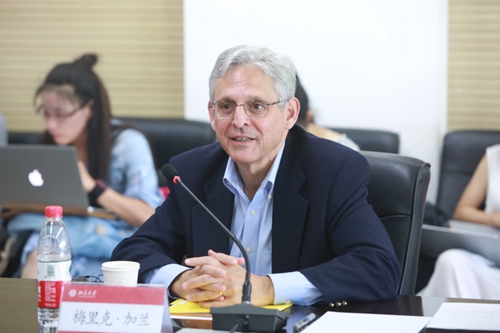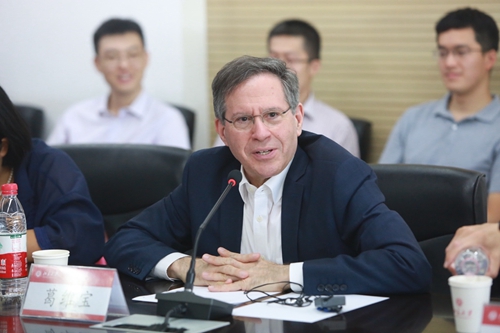“The Role of Courts in the U.S. Legal System” —Lecture of Chief Judge Merrick B. Garland was Held
Date:2017-10-17
On the morning of Aug. 24, 2017, Chief Judge Merrick B. Garland of the United States Court of Appeals for the District of Columbia Circuit visited Peking University Law School, and made remarks on the role of courts in the U.S. legal system in room 307, (Leo) Koguan Building. Paul D. Gewirtz, the Director of Cai Zhongceng China Center of Yale University Law School, the U.S. Justice Department's Legal Adviser Ye Ting Woo, the Director of Beijing Office of Cai Zhongceng China Center of Yale University Law School Jeremy Daum, a researcher at the Chinese Academy of Social Sciences(CASS) Zhou Hanhua, partners from Beijing Office of King & Wood Law Firm Wang Rui, Hu Qian, Yuan Min, a partner of Beijing Long An Law Firm Chen Xu, the Vice President of Zheng Da Group Yue Zheng, and Prof. Zhang Shouwen, the Dean of Peking University Law School, the Vice Dean Prof. Wang Xixin, the Vice Dean Prof. Guo Li, Assistant Dean Yang Ming, Prof. Fu Yulin, A.P. Liu Zhewei, Assistant Dean and Director of External Affairs Office Liu Yuanyuan, attended the meeting.
Chief Judge Garland introduced the U.S. constitutional provisions on judicial power, the jurisdiction of U.S. federal courts, and the federal administrative procedures in the U.S., and noted the functions of courts and the standard for judicial review under the system of checks and balances. Article I, II and III of the U.S. Constitution respectively set forth the legislative, executive and judicial powers of the federal government, and establish the general structure of that decentralized government. Article III lays the foundation of the federal court's judicial powers, the jurisdiction of which is strictly defined by the Article III of the U.S. Constitution. Generally, the jurisdiction of federal courts extends to cases arising under the federal laws, and controversies between citizens of different states. The federal court system consists of 94 federal district courts, 13 courts of appeals, and the Supreme Court of the United States. Judge Garland adds, that the court should focus on considering whether the rules of the administrative organs or decision is arbitrary, obviously unreasonable, in violation of the provisions of the relevant procedure, rather than take the place of the executive branch technocrats to evaluate the entity content of rules or decisions. Therefore, if the administrative officials give reasonable explanations to the entity content of rules or decisions, and observe the relevant provisions of federal administrative procedural laws, courts should maintain these rules or decisions.

Chief Judge Merrick B. Garland
Prof. Paul D. Gewirtz has carried on the appraisal to Judge Garland's speech, and made comments about " the Trend of America’s Political Polarization and Politicization about the Nomination of Justices"

Prof. Paul D. Gewirtz

Translated by: Gong Wen
Edited by:Hang Jiajia


